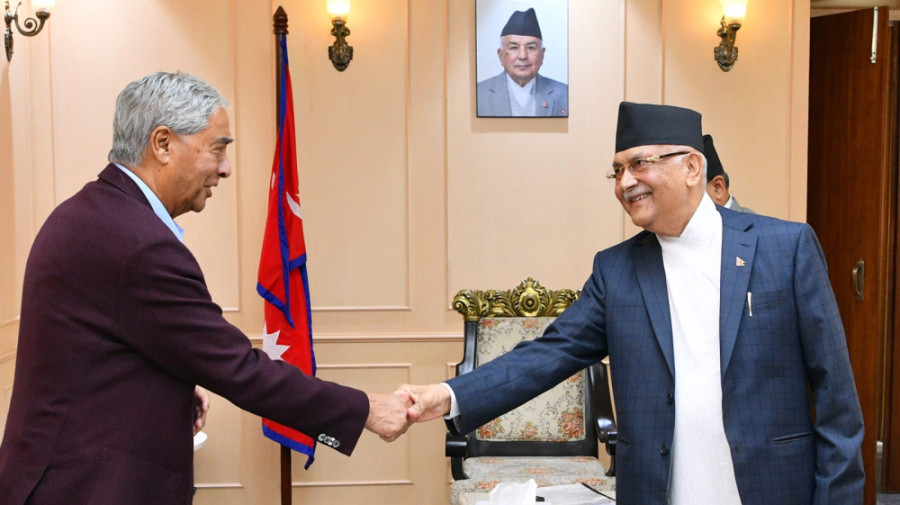Columns
Deuba’s dance with Oli
Congress risks stumbling over its party chief’s personal ambitions.
Sanjeev Satgainya
Nepali Congress President Sher Bahadur Deuba is a man of few words. He rarely makes public statements, and when he does, his remarks are peculiarly straightforward, lacking subtext.
Yet, a recent comment he made—that the KP Oli government is doing a good job—stood out. Despite its brevity, the comment carried a hint of hidden meaning.
One may wonder how Deuba, who has himself served as prime minister and is angling for a sixth term, would explain just what “good job” the Oli government has done so far. In fact, in the more than four months since Deuba elevated Oli to the prime minister’s seat, the coalition has yet to deliver anything that justifies such a claim.
The current government has fallen short on nearly every front, mirroring the failures of the previous administration under Maoist Centre Chairman Pushpa Kamal Dahal. So why, then, is Deuba so enthusiastically heaping praise on Oli, his long-time political adversary?
More than meets the eye
Deuba has a long political history, and his contributions to democratic changes cannot be ignored. But he is not the man who inspires hope. His five previous stints as prime minister were marred by governance failures and a general lack of vision. Deuba, however, has a reputation as a shrewd political player, just like his contemporaries—Oli and Dahal. But there is a contrast. He is adept at manoeuvring in the shadows and pulling off backroom deals. The other two are more loquacious, outspoken and effervescent, with their political strategies often playing out in full public view.
Securing a power-sharing deal with Oli was nothing short of a masterstroke for Deuba, especially since he did so at a time when his party members, particularly the two general secretaries, were vehemently opposed to joining a coalition government until the next elections. Yet, he offered the government leadership to the wily Oli on a platter while managing to quell the dissenters.
Some Congress leaders privately admit that Deuba’s intentions are often difficult to discern, given his tendency to talk less and keep his cards close. In the 2022 elections, Congress was voted as the single largest party, making it the natural claimant to the government, yet it has been content, or been forced to be, to play second fiddle. It’s not difficult to comprehend the unease Deuba may have been going through for not being able to wield power as the head of the government.
The silence of the critics
Deuba knows in his heart that Oli is not a man to be trusted, yet his submission to the latter is befuddling. Interestingly, the same general secretaries who tirelessly opposed Congress’s involvement in a coalition are now conspicuously silent, even offering to facilitate Deuba’s pathway to a sixth term. Their uncanny silence appears to have given Deuba free rein in the party.
Gagan Thapa, one of the general secretaries who fiercely advocated for staying in the opposition until the next elections, now seems to have muted his voice—perhaps in hopes of eventually leading the party himself in return for helping Deuba secure the top job.
What’s also intriguing is that Thapa has chosen not to raise issues of corruption, irregularities and governance failures with the same intensity he used to until a few months ago. A vocal critic of the so-called political mechanisms that coalition parties often institute to oversee government functions, Thapa has now consented to be part of a similar mechanism formed by Oli and Deuba. He seems to have realised that it’s better to play along with Deuba, as exhausting energy on stopping him from becoming prime minister—as long as Oli keeps his promise—is an effort wasted.
Those rooting for Thapa may argue that the general secretary is now in a “strength-building” exercise, with his sights set on the next general convention. However, in Congress, where factionalism runs deep, the future is uncertain.
Thapa, long seen as a leader who could inject new ideas into Congress and steer the party in the right direction, risks becoming a spent force due to his vacillations and ambivalence, as well as external factors. The rise of independent candidates and new political forces, particularly the Rastriya Swatantra Party, has become a formidable challenge. While Thapa’s struggle within the party is immense, he faces competition not only from the old guard but also from the new wave.
On the question of credibility, public trust in Congress, UML and the Maoist Centre is at an all-time low. Nepali voters view the major parties as tainted and corrupt. Even if one argues that a leader’s personal integrity is separate from their political record, the two are intrinsically linked. It’s not enough for politicians to be clean; they must also appear clean.
How long Thapa can sustain his fight for change remains to be seen.
The last temptation
Deuba’s power rests firmly in his hold over the party. But in the coming days, the dynamics within Congress are bound to change, and he wants to forge the path to Baluwatar while the party is still under his control. He knows that, in time, the party mantle needs to be passed to the next generation.
Just shy of 80, Deuba faces what is likely his last chance at power—a chance that is wholly contingent on Oli. Despite being well aware of Oli’s infamous unpredictability, Deuba sees him as his best bet for securing one more term.
Still, Deuba has yet to make a convincing case for what he might accomplish if he makes it to Singha Durbar with Oli’s support. Of all people, he understands the challenges of running a coalition, especially with a partner as unpredictable as Oli.
Yet, Deuba is a patient man. His reticence works to his advantage. He knows well that a little flattery costs nothing, and he has been generously showering it on Oli. So “democratic and liberal” is Deuba that he easily shakes off criticism and doesn’t mind being called submissive if it means his ultimate goal—the prime ministerial seat—remains within reach. A party for posterity, however, does not seem to be at the top of his agenda. The grand old party seems to be sinking, dragged down by Deuba’s questionable allegiance to Oli in pursuit of personal ambitions.




 8.26°C Kathmandu
8.26°C Kathmandu















